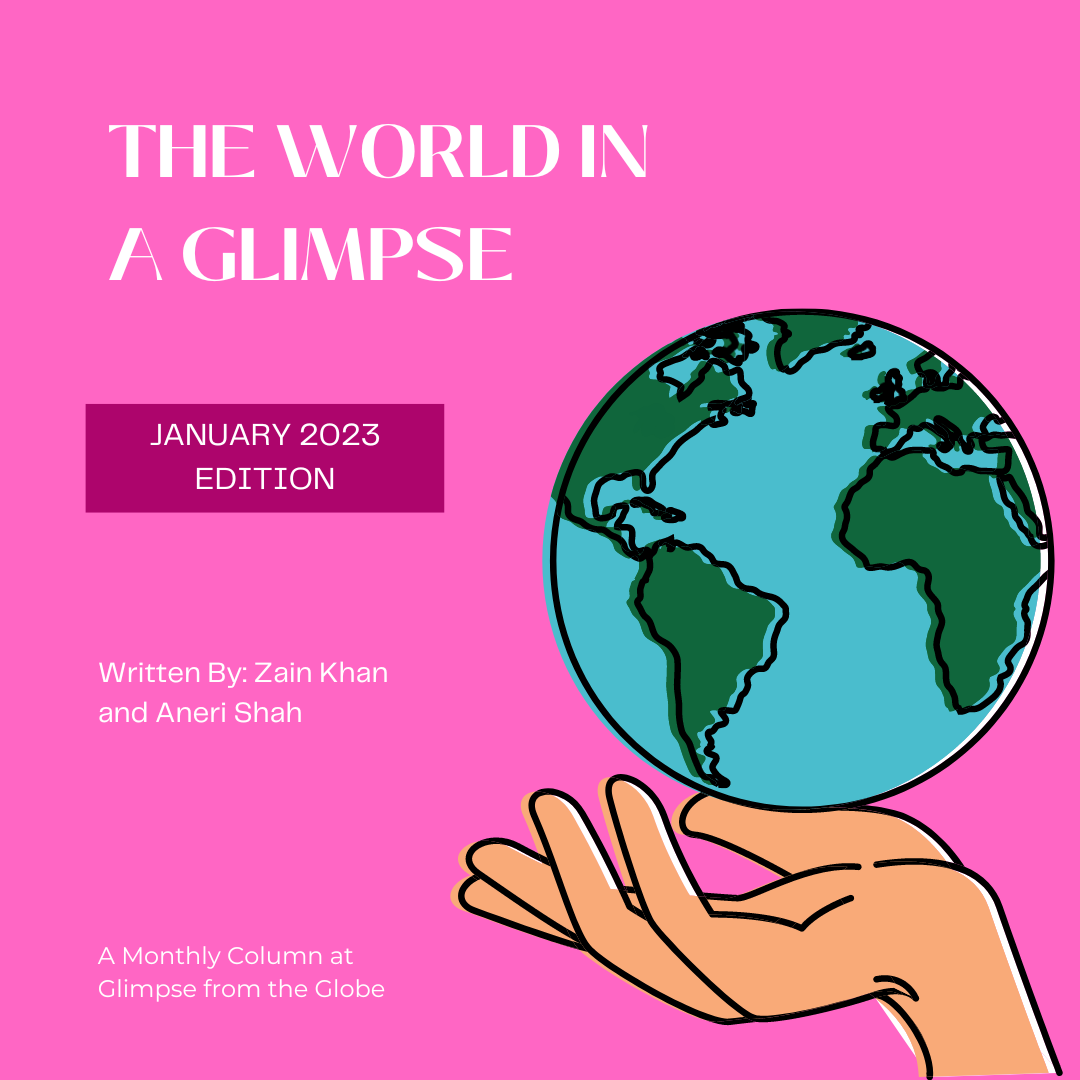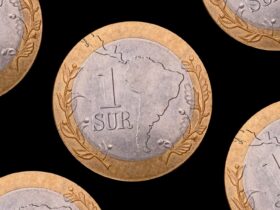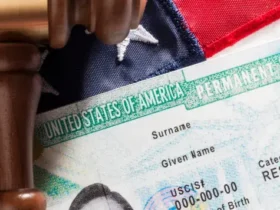By: Zain Khan and Aneri Shah
INTERNATIONAL
Fears of Damaging Global Recession Recede, For Now
This autumn, fears of a recession spiked anxieties in large economies in the global community. For the United States, it was a salient issue in the midterm elections. Europeans braced for the winter season and its accompanying energy costs, and China continued to be stifled by their zero-covid policies.
For now, some of these concerns seem to be abating. Prices have fallen in the United States since the election, winter in Europe has been relatively mild, and China has ended its ‘zero-COVID’ policy. Unfortunately, many economists believe a cooldown is still necessary. In order to properly slow down the economy, they believe central banks must keep interest rates higher, which will have wide and long-lasting effects across many economies. The global market proves to be unpredictable, though, so many will have to be attentive to changes in the coming months.
NORTH AMERICA & SOUTH AMERICA
Brazil
Brazil’s Insurrection Emulates the United States as Lula Steps Into the Presidency
After the close election of Bolsonaro and Lula de Silva, the concession to power seemed to be going fairly well, despite Bolsonaro sowing seeds of doubts for years before the election.
However, just days after Lula de Silva took office, Bolsonaro supporters swarmed the Capitol, pushing their way inside Congress and the Supreme Court. With an uncanny resemblance to the United States, some media outlets are calling it another Jan 6.’
Consequences of this are sweeping in quickly. Brazil reports that over 300 people have been arrested and Brazil’s governor, Ibaneis Rocha, has been removed from his post.
The riots are only one of many challenges de Silva will be facing as president. Inflation is concerningly high, large amounts of spending to maintain the countries needed, poverty rates are increasing, and, as home to the Amazon rainforest, Brazil’s environmental mandates are demanding. Lula’s left-leaning policies aimed at resolving these issues, but they must be done in the increasingly tougher global market.
United States
The American Crisis in Elected Officials
The United States still seems to be feeling the consequences of its midterm elections. Earlier this month, Republican lawmakers struggled to elect a leader, and finally voted senator McCarthy after 15 votes over 5 days. In order for this to be possible, McCarthy had to make concessions to a more conservative swath of his party, bringing in a new era for the GOP. With the House already divided, the compromise needed to pass legislation becomes increasingly difficult.
Republicans face another crisis of confidence through a Republican from New York, George Santos. He curated a facade of being a product of the American dream; upon further research however it seems very little of his supposed life story is actually true. While his lies include a criminal charge in Brazil and his educational credentials, the thing that shocked Republicans most was perhaps photos of him surfacing in drag.
Finally, classified documents have been found at the homes at both Joe Biden and Donald Trump’s houses this month. While both are breaches in confidence, it should be noted that the Justice Department stated Biden had around 300 documents and self-reported the documents. Trump was visited by the FBI at Mar-a-Lago, and 33 boxes with 11,000 documents have been taken.
Peru
Deadly Protests Continue, and Future of The Presidency Remains Unclear
After then-President Castillo attempted to dissolve Congress to prevent them from voting on his third impeachment, protests erupted in Peru. Current President Dina Boluarte struggles to manage them. Protesters have erected roadblocks, creating shortages in food, medicine, and other essentials. Dozens have been killed, some of which happened at the country’s airports, which the protesters tried to storm.
While Boluarte’s approach to quelling protests has been criticized for their violence, she has made clear that she has no interest in being president. She offered a bill that moved a new general election up from 2026 to 2024 to assuage the protesters in December. This month, she tried to propose a bill that moved it up further to late 2023, but that was shot down by the Peruvian Congress.
It is unclear exactly what the protestors want. Some want President Castillo back, despite him currently being in pretrial detention. Some may not be happy until new elections arrive in Peru. Either way, the resolution to Peru’s political turmoil remains unclear.
Haiti
Haiti’s Breaking Point and the American Response
After years of national disasters and political turnover, Haiti is engulfed in gang violence that has taken the nation hostage. Close to 60 percent of the capital is controlled by gangs, who use horrifying levels of sexual violence to control the nation. Gangs kill and kidnap others at will. The country is currently leaderless, as most of the elected officials have left the nation.
Additionally, as the country is steeped in famine-like conditions, cholera has made a comeback, killing a confirmed 283 people, with thousands more cases suspected.
With these conditions, there is an exodus in Haiti — but nowhere for them to go. The Biden Administration is weighing how to handle the migrants from the country, from expanding the current facility at Guantanamo Bay to holding them at a third nation temporarily. Additionally, many more migrants may come when there are no longer blockages to power and gas. As Haiti continues to burn, the Biden Administration needs to make decisions, and quickly, on how to aid the victims from a nation flooded with terrifying violence and death.
ASIA & CENTRAL ASIA
China
China Reopens and Feels COVID-19’s Effects
After China suddenly ended their longstanding ‘zero-Covid’ policy, COVID-19 has ravaged the country. Without adequate information on vaccines or support for medical institutions, many of China’s deaths due to Covid were wholly preventable. However, the CDC said there were no immediate spikes after the Lunar New Year, which was also this month.
Through rescinding this policy, it is clear that China wants to return to high economic growth, rather than sensible covid policies. Additionally, its nationalism prevents it from accurately and clearly reporting data; China’s data is believed to be widely underreported.
India
India Bans the BBC documentary, India: The Modi Question
BBC’s latest documentary has caused a stir, given its criticism of Prime Minister Narendra Modi and his role in the Gujarat riots of 2002. The current PM was serving as the Chief Minister of Gujarat at the time of the riots and critics have pointed out his lack of action during the gruesome events. The government cited that the documentary portrays anti-Modi rhetoric and interferes with domestic politics. They effectively silenced any potential criticism from citizens, particularly Muslim citizens.
As a result of the documentary and India’s response, the country is under international scrutiny and has heightened Indian-U.K. relations. The ban on the documentary is more than just censorship — it is a leap towards the same kind of governance India once fought against under British colonialism. In recent years, Modi’s BJP party has carried out local and national efforts to proselytize its minorities and promote its Hindu nationalist ideology.
Pakistan
Pakistan’s Week of Diplomacy Starts With Deadly Mosque Bombing
At least 59 people have been killed and 157 injured at a suicide bombing in a mosque in Peshawar. This bombing apparently targeted policemen who had been praying in the mosque. A similar bombing happened last month, targeting a police station. It is unsure at the time of writing whether these events are related.
The timing of the bombing is of interest as well, especially on the foreign affairs front.This week, the president of the UAE was said to visit Islamabad, but that was canceled due to the weather. Additionally, the IMF was set to visit the country in order to unlock a bailout loan. For now, the country is on high alert.
Nepal
Plane Crash in Nepal Claims Lives of 72
On Sunday Jan. 15, Yeti Airlines flight 691 crashed into the tourist-heavy city in Nepal, Pokhara. Most of the passengers were medical students returning to Nepal as the new semester begins. There were 72 deaths, among them 68 were civilian passengers and four were crew members. Videos on social media showed the plane engulfed by flames and black plumes of smoke at the crash site, where emergency responders were seen trying to retrieve victims. The search for any potential supervisors was called off within days of the crash.
THE MIDDLE EAST & AFRICA
Egypt
U.S. Secretary of State in Egypt Amid Rising Tensions in the Middle East
The top leadership of the American government flew to Egypt on Jan. 29 as violence between the Israeli forces and its Palestinian counterpart escalated. Secretary Anthony Blinken is expected to make a trip, following his visit to Cairo, to Israel and the West Bank.
On Jan. 26, nine people were killed in an Israeli army raid on the Jenin refugee camp in the West Bank in one of the deadliest such operations in years. Israel said it was targeting Islamic Jihad militants and later hit the Hamas-ruled Gaza Strip in response to rocket fire. Blinken will meet Israeli Prime Minister Benjamin Netanyahu and Palestinian leader Mahmud Abbas and call “broadly for steps to be taken to de-escalate tensions,” State Department spokesman Vedant Patel told reporters as he condemned the “horrific” synagogue attack.
The Middle East has always been a key region of interest for the United States and Israel seems to be emerging as its strongest ally in order to have a strong hold.
Iran
Iranians Anger Seethes as Protests Recede
Four months later, Iranians are still leading their unprecedented levels of protest, as a new injustice by the state is publicized. Protestors have started to be hanged, bringing new levels of grief to the country. Over 20,000 people have been locked up, and many have been shot and hurt by rubber bullets or metal pellets. There have been reports of those sustaining these injuries being arrested in the hospital after their surgeries. Protests surged again earlier this month after the commemoration of a passenger jet shot down in 2020.
However, Iranians seem to be pulled back towards their normal life. Inflation is so high in the country, some have turned to a barter system. University campuses, which were once a site for some of the most heaviest protests, have quieted and are being heavily policed.
Getting a clear picture on Iran has become exceedingly difficult, as foreign journalists are not welcome, and many journalists already in Iran have been jailed. As the media outside of Iran pieces together the fragments that they can get from small videos and witness testimonies, one thing remains clear: Iranians’ anger has not and will not be quieted so long as they are under the regime.
Somalia
ISIS Leader Killed in a U.S.-led Raid
Bilal-al-Sudani, a leader of the Islamic State, was killed along with 10 of his operatives in Northern Somalia. The strike was ordered by U.S. President Joe Biden on Jan. 25. The U.S. operation targeted al-Sudani, an important Islamic State financial facilitator, and took place in the Cal Miskaad mountains, in a remote cave complex in the Bari region of Somalia’s Puntland state.
Kenya
Venezuelan Diplomat Convicted over Murder of Ambassador
A Venezuelan diplomat was found guilty in a Kenyan court for the murder of the acting Venezuelan ambassador 10 years ago. Dwight Sagaray, who was the first secretary at the embassy, was found guilty of the Jul. 2012 killing of Olga Fonseca, Judge Roselyn Korir said in her ruling on Wednesday. The court also convicted three Kenyan nationals who had been charged alongside Sagaray, saying they were involved in a common plan to carry out the murder. Fonseca, 57, was found strangled in her bedroom less than two weeks into her posting to Nairobi, which followed the abrupt departure of the previous ambassador after he was accused by his domestic staff of sexual harassment
Malawi
Worst Cholera Outbreak, 750 Dead and Counting
The country has reported its worst ever cholera outbreak over the past two decades. The country has had a death toll of 750 with numerous people taking the disease everyday. The World Health Organization chief described the southeast African country as among the hardest-hit amid ongoing global epidemics that are “more widespread and deadly than normal”.
Malawi’s Health Minister Khumbize Kandodo Chiponda on Jan. 12 ordered the closure of many businesses that lack safe water, toilets and hygienic refuse disposal facilities, and announced restrictions on the sale of pre-cooked food. According to the health minister, the country has recorded 22,759 cases since the onset of the outbreak in March last year
Israel
Netanyahu’s Right Wing Shift Weakens Supreme Court
Sworn in for his sixth term in office, Netanyahu was named prime minister in late December. However, this government coalition may look a little different than his previous terms, as they include more far right parties. While Netanyahu has promised not to only consider their agenda, the centrist parties of the countries are notably absent; they refused to serve under a prime minister that is convicted of fraud and corruption. This is in reference to an ongoing trial, in which Netanyahu is accused of granting certain Israeli media outlets favors in exchange for a more generous portrayal of himself.
This month, Netanyahu’s new right wing shift manifested itself in new legislation against the Supreme Court. Netanyahu’s justice minister, Yariv Levin, wants to have an ‘override’ clause which would allow the Israeli parliament to override a Court decision to pass potentially unconstitutional laws. Additionally, it would make the court unable to strike down government decisions on the ground of ‘reasonableness.’ These, among other reforms, would destroy the Supreme Court’s independence from the other branches of government.
In response to this, thousands of Israelis have taken to the streets in protest for the past couple weeks. “No to dictatorship,” they chant, as some experts warn that the passage of these ‘reforms’ would signal an end to democracy.
Tunisia
Low Turnout in Tunisian Elections Not Promising for Future of Democracy
Tunisia will undergo elections this month, but startling low turnout is expected with the first round of voting in December only seeing 11.2% of registered voters go to the polls. This reflects the illegitimacy that citizens see in the system; their lack of enthusiasm is not without its merits. Since President Kais Saied was elected president in 2019, he has dissolved parliament and changed the constitution, with the new legislature having little to no power to hold the presidency accountable.
Tunisians don’t see politics as a viable way to reach their goals. As they are experiencing budget deficits, they are often not able to pay for adequate amounts of food, medicine, oil, and other essentials. While the country is going through sluggish negotiations with the IMF for a 2 billion dollar bailout, around 32,000 citizens have chosen to leave the country entirely.
PACIFIC
New Zealand
Prime Minister Jacinda Arden Set to Resign
On Jan. 19, the world’s youngest leader to ever be elected and the prime minister of New Zealand announced that she would be stepping down as the leader of the country no later than Feb. 7.
“I’m leaving, because with such a privileged role comes responsibility – the responsibility to know when you are the right person to lead and also when you are not. I know what this job takes. And I know that I no longer have enough in the tank to do it justice. It’s that simple,” she said.
Arden’s time in office was marked by numerous hardships, including the COVID-19 pandemic, the Mar. 2019 Christchurch mosque shootings and the Dec. 2019 White Island volcano eruption. She steered her country through the pandemic and emerged as one of the world’s most recognizable heads of government.
Kiribati
Kiribati Rejoins Pacific Forum
The island nation of Kiribati rejoins the Pacific Forum, signaling the end of a rift that seemed to be fracturing in the region. Kiribati withdrew from the forum mid-2022, citing lack of input in the bureaucratic arm of the organization. Some thought that the timing of the exit indicated taking the Chinese side in the U.S.-China rivalry, but after a visit from the Prime Minister of Fiji armed with a formal apology, it seems the island nation is back in the regional forum.
EUROPE
France
Macron Aims to Raise Retirement Age 62 to 64
French President Emmanuel Macron, on Jan 10, announced that the government plans to raise the retirement age of its citizens from 62 to 64 as is “no longer negotiable”. A union-led online petition against the retirement plan saw a surge in new signatures after Borne’s comments.
Mr. Macron’s last attempt to change the pension system in 2019 prompted massive street protests and one of the longest transportation strikes in France’s history, until the Covid-19 pandemic hit and the government shelved the plan. The plan is a more straightforward attempt to balance the system’s budget by making the French work longer, a move that is still likely to meet strong popular resistance.
The bill goes to a parliamentary commission on Monday, and to a full debate in the National Assembly on Feb. 6. Opponents have submitted 7,000 proposed amendments that will further complicate the debate.
Ukraine
German and U.S. Tanks are Due to Arrive in Ukraine
German and American tanks are headed to Ukraine to assist in the country’s ongoing resistance to the Russian invasion. There is potential for this action to heighten tensions between the united West (the United States and Europe) and Putin. Germany’s agreement to send weapons and now these tanks come almost after a year of denying military support to Ukraine. The leaders of the United States and Germany each announced Wednesday they will send contingents of tanks to Ukraine, reversing their longstanding trepidation at providing Kyiv with offensive armored vehicles and unleashing powerful new tools in Ukraine’s efforts to retake territory seized by Russia.
Russia
Russia’s Relationships After Ukraine
After the ongoing, unprovoked attack on Ukraine, the international community shunned Russia, looking at ways to punish Russia, especially economically, for their crimes. This month, the United States targeted the Wagner Group, labeling them a ‘transnational criminal organization.’ The Treasury Department sanctioned individuals and entities with ties to the Wagner Group, hoping to interfere with Russia’s ability to buy war materials.
Even with a myriad of sanctions and restrictions, Russia’s trade seems to have been resilient, appearing at pre-war levels. Some believe that many neighboring countries have continued to trade with Russia, including China and Turkey. Additionally, many firms in the European Union may have kept economic ties in Russia.
On the domestic side, an unusual move of resistance was seen when over 200 doctors signed a petition to Putin to stop the abuse of Aleksei Navalny, Putin’s most known political opponent. This public criticism is rare and bold, as many professionals have been fired or faced criminal charges for speaking out against Russian activities. Navalny’s health was first jeopardized in late 2020 after being poisoned by a military-grade nerve agent that American intelligence sources attribute to Russian agents.
Turkey
Turkey Threatens Potential NATO Membership for Sweden
Ankara has refused to ratify the two countries’ NATO membership bids, primarily because of Sweden’s refusal to extradite dozens of suspects that Ankara links to outlawed Kurdish fighters and a failed 2016 coup attempt. Sweden has a bigger Kurdish diaspora than Finland and a more serious dispute with Ankara.
“We may deliver Finland a different message [on their NATO application]and Sweden would be shocked when they see our message. But Finland should not make the same mistake Sweden did,” Erdogan said in a televised speech aired on Sunday. Sweden and Finland applied last year to join NATO after Russia’s invasion of Ukraine, dropping their long standing military nonalignment.







